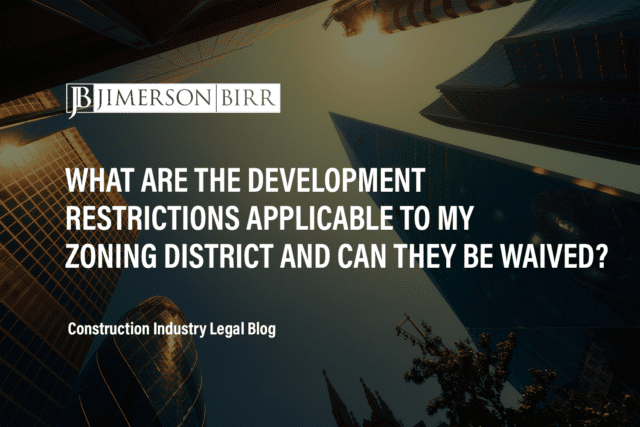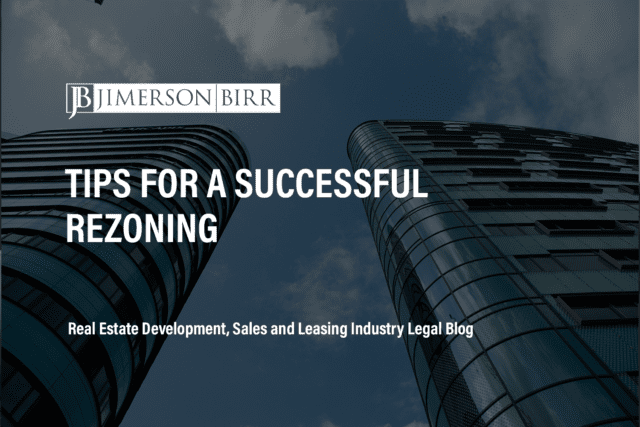What are zoning, comprehensive plan, and master plan amendments?
Zoning, comprehensive plans, and master plan amendments are all tools used to regulate land use and development within a jurisdiction. Here’s a brief overview of each:
- Zoning Amendments: Zoning amendments modify the zoning regulations that govern land use within a particular area. These amendments may change the permitted uses, density, or other requirements for a specific zone or district. Zoning amendments are typically initiated by property owners, developers, or local governments in response to changing market conditions, community needs, or other factors.
- Comprehensive Plan Amendments: A comprehensive plan is a long-range planning document outlining how a jurisdiction will grow and develop over time. Comprehensive plans typically include goals and policies related to land use, transportation, housing, environmental protection, and other issues. Comprehensive plan amendments modify the goals, policies, or other plan elements to reflect changing conditions or new priorities.
- Master Plan Amendments: A master plan is a detailed document focusing on a specific area or project, such as a downtown district or a large development. Master plans typically include detailed land use and design guidelines, infrastructure requirements, and other specifications for the project. Master plan amendments modify these guidelines or specifications to reflect changing conditions or new priorities.
All three amendments typically go through a public review process that includes input from stakeholders, such as property owners, community groups, and local officials. The review process generally includes public hearings, stakeholder meetings, and other opportunities for feedback and comment.
Need help with a matter related to zoning, comprehensive plan, and master plan amendments? Schedule your consultation today with a top land use and zoning attorney.
In Florida, which laws and regulations relate to zoning, comprehensive plan, and master plan amendments?
- Florida Statutes §§ 163.2511 – 163.3253: This statute sets forth the requirements for local comprehensive planning in Florida, including the adoption, amendment, and evaluation of comprehensive plans.
- Local Zoning and Land Use Regulations: In addition to state laws and regulations, each municipality and county in Florida has its own set of zoning and land use regulations that govern development within their jurisdiction. These regulations typically include zoning maps, district descriptions, permitted uses, density requirements, setbacks, and other provisions that guide development in the area.
- Local Comprehensive Plans and Master Plans: Many municipalities and counties in Florida have comprehensive plans and master plans that guide development within their jurisdiction. These plans typically include goals, policies, and recommendations for land use, transportation, housing, environmental protection, and other issues.
What are common issues regarding zoning, comprehensive plans, and master plan amendments that lead to litigation?
The following issues are among the most common in actions regarding zoning, comprehensive plan, and master plan amendments in land use and zoning matters:
- Constitutional Challenges: Property owners or developers may challenge zoning, comprehensive plan, or master plan amendments on constitutional grounds, such as due process violations, equal protection, or takings clauses. These challenges may arise if a property owner believes that a regulation unfairly restricts their property rights or that the government has not followed proper procedures in adopting the regulation.
- Procedural Challenges: Challenges to zoning, comprehensive plan, or master plan amendments may also arise due to procedural irregularities or errors. For example, a developer may challenge a zoning amendment if they believe that the public notice and comment requirements were not met or that the government did not follow proper procedures in adopting the regulation.
- Competing Interests: Zoning, comprehensive plan, and master plan amendments may also lead to litigation if competing interests are involved. For example, neighboring property owners or community groups may challenge a development project if they believe it will negatively impact their property values, quality of life, or environmental resources.
- Disputes Over Interpretation: Disputes over the interpretation of zoning, comprehensive plan, or master plan amendments may also lead to litigation. For example, a property owner or developer may argue that a regulation is ambiguous or that the government has misapplied it.
- Inconsistencies with State or Federal Law: Zoning, comprehensive plan, or master plan amendments may also be challenged if they conflict with state or federal law. For example, a regulation may be challenged if it violates the Florida Growth Management Act or the Americans with Disabilities Act.
We are value-based attorneys at Jimerson Birr, which means we look at each action with our clients from the point of view of costs and benefits while reducing liability. Then, based on our client’s objectives, we chart a path to seek appropriate remedies.
To determine whether your unique situation may necessitate litigation, please contact our office to set up your initial consultation.
What are effective measures to minimize the risk of litigation over zoning, comprehensive plan, and master plan amendments?
Some measures to minimize the risk of litigation include:
- Following Proper Procedures: One of the most effective measures to minimize the risk of litigation is to ensure that proper procedures are followed in adopting zoning, comprehensive plans, and master plan amendments. This includes providing adequate public notice and opportunity for public comment, following established review procedures and adhering to statutory and regulatory requirements.
- Addressing Concerns Early On: Addressing concerns and issues raised by stakeholders early on in the process can help reduce the risk of disputes or litigation down the road. This can include incorporating feedback into project plans, mitigating potential impacts, and finding creative solutions to address concerns.
- Engaging with Stakeholders: Engaging with stakeholders, including neighboring property owners, community groups, and other interested parties, can help identify potential issues early on in the process and allow for collaborative problem-solving. This can help build support for the project and reduce the likelihood of disputes or litigation.
- Conducting Thorough Research: Conducting thorough research on the project site and surrounding area can help identify potential issues or conflicts that may arise during the regulatory process. This can include researching zoning, land use, and environmental regulations, engaging with local stakeholders, and conducting site assessments.
- Maintaining Transparency: Maintaining transparency throughout the regulatory process, including providing clear and consistent communication with stakeholders and informing the public of project developments, can help build trust and reduce the likelihood of disputes or litigation.
What evidence does a plaintiff generally need to successfully file a lawsuit regarding zoning, comprehensive plan, and master plan amendments, and what are common legal defenses to those claims?
To successfully file a lawsuit regarding zoning, comprehensive plan, and master plan amendments, a plaintiff must provide evidence that their legal rights have been infringed upon or that they have suffered harm or damages due to the regulatory action. Here are some types of evidence that may be used in such cases:
- Evidence of Harm: The plaintiff must provide evidence of harm or damages they have suffered due to the zoning, comprehensive plan, or master plan amendment. This may include proof of economic harm, loss of property value, or environmental harm.
- Evidence of Procedural Irregularities: Also crucial, if available, is evidence of procedural irregularities in adopting the zoning, comprehensive plan, or master plan amendment. This may include proof of statutory or regulatory requirements violations or evidence that proper procedures were not followed.
- Evidence of Constitutional Violations: Further, the plaintiff can present evidence of constitutional violations, such as due process violations, equal protection, or takings clauses. This may include proof that the regulation unfairly restricts the plaintiff’s property rights or that the government has not adopted the regulation properly.
- Evidence of Inconsistencies with State or Federal Law: If applicable, evidence that the zoning, comprehensive plan, or master plan amendment conflicts with state or federal law may further support the need for an amendment. For example, this may include proof that the regulation violates the Florida Growth Management Act or the federal Americans with Disabilities Act.
Common legal defenses to these claims may include:
- Statutory Compliance: Governmental entities may argue that they followed all statutory and regulatory requirements in adopting the zoning, comprehensive plan, or master plan amendment.
- Legitimate Government Purpose: Often, an entity will argue that the zoning, comprehensive plan, or master plan amendment serves a legitimate government purpose, such as protecting public health, safety, or welfare.
- Rational Basis: Courts will generally uphold zoning, comprehensive plan, and master plan amendments if they are rationally related to a legitimate government purpose, even if the plaintiff disagrees with the regulatory decision.
- Lack of Standing: Governments may also argue that the plaintiff does not have standing to bring the lawsuit because they have not suffered concrete harm or injury.
To see what actions or defenses may be available for your unique situation, please contact our office to set up your initial consultation.
Frequently Asked Questions
Can a property owner challenge a zoning, comprehensive plan, or master plan amendment?
Yes, a property owner may challenge a zoning, comprehensive plan, or master plan amendment if they believe it infringes on their property rights or the regulatory process was improperly followed.
What common issues can arise during the zoning, comprehensive plan, and master plan amendment process?
Some common issues that can arise during the zoning, comprehensive plan, and master plan amendment process include conflicts between different types of land use, concerns over environmental impacts, disputes over property rights, and disagreements over the appropriate level of community involvement and input.
Have more questions about a zoning, comprehensive plan, and master plan amendments-related situation?
Crucially, this overview of zoning, comprehensive plan, and master plan amendments does not begin to cover all the laws implicated by this issue or the factors that may compel the application of such laws. Every case is unique, and the laws can produce different outcomes depending on the individual circumstances.
Jimerson Birr attorneys guide our clients to help make informed decisions while ensuring their rights are respected and protected. Our lawyers are highly trained and experienced in the nuances of the law, so they can accurately interpret statutes and case law and holistically prepare individuals or companies for their legal endeavors. Through this intense personal investment and advocacy, our lawyers will help resolve the issue’s complicated legal problems efficiently and effectively.
Having a Jimerson Birr attorney on your side means securing a team of seasoned, multi-dimensional, cross-functional legal professionals. Whether it is a transaction, an operational issue, a regulatory challenge, or a contested legal predicament that may require court intervention, we remain a tireless advocate every step of the way. Being a value-added law firm means putting the client at the forefront of everything we do. We use our experience to help our clients navigate even the most complex problems and come out the other side triumphant.
If you want to understand your case, the merits of your claim or defense, potential monetary awards, or the amount of exposure you face, you should speak with a qualified Jimerson Birr lawyer. Our experienced team of attorneys is here to help. Call Jimerson Birr at (904) 389-0050 or use the contact form to set up a consultation.
Here are some blogs written by JB attorneys that provide more information about zoning, comprehensive plan, and master plan amendments:

We live by our 7 Superior Service Commitments
- Conferring Client-Defined Value
- Efficient and Cost-Effective
- Accessibility
- Delivering an Experience While Delivering Results
- Meaningful and Enduring Partnership
- Exceptional Communication Based Upon Listening
- Accountability to Goals











